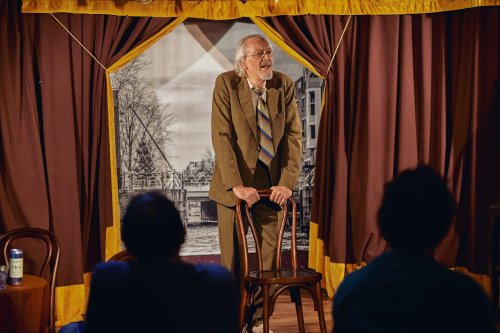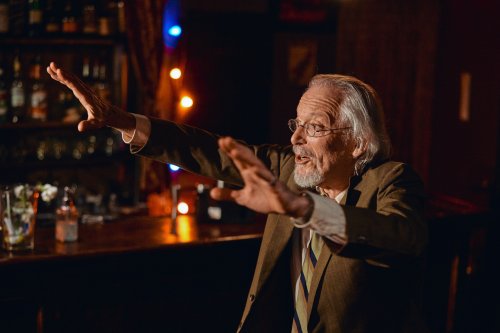Albert Camus’ “The Fall”
A once successful lawyer, now “judge-repentent”, takes us into his mindset for a lesson in responsibility and guilt, mostly his own, in a dive bar in Amsterdam.

Ronald Guttman in Alexis Lloyd’s adaptation of Albert Camus’ “The Fall” at The Huron Club at The SoHo Playhouse (Photo credit: Zack DeZon)
[avatar user=”Tony Marinelli” size=”96″ align=”left”] Tony Marinelli, Critic[/avatar]
Belgian actor Ronald Guttman gives a subtle, yet wrenching performance in The Fall, expounding the philosophies of Albert Camus trapped in the sad and now resigned character of the exiled Parisian lawyer Jean-Baptiste Clamence. Fellow bar mates, we the audience, are his confessors in a sailors’ dive bar in Amsterdam’s red-light district circa 1956.
In adapting Camus’ last completed novel for the stage, Alexis Lloyd, has created a role of controlled emotions that belie the seething honesty struggling to rear its ugly head. Director Didier Flamand encourages the full use of the space to make constant contact with members of the audience. Turning around from ordering his drink at the bar, Guttman is in the best position to orate at will. As the performance takes place (and fits very neatly) in the entirety of the Huron Bar (the lower level of the SoHo Playhouse), the original architect of the building should be entitled to a scenic design credit. The best seat in the house is occupied by the bartender.
Clamence is very much a tortured soul. Once someone well-off and of considerable status, he thinks little of himself now, one of the regular denizens of a bar known as Mexico City. In his opening moments in a conversation with a member of the audience that he has pegged as a “kind of a businessman?…sophisticated upper-middle-class,” he surmises, “And you find me amusing, which means you’re open minded. Kind of… As for me, well, I’ll let you be the judge of that. In spite of my good manners, and my way with words, I am a regular of these sailors’ dives, here in Amsterdam. There’s only one thing simple about me: I don’t own anything. I used to, I used to be wealthy, back in Paris.” His advice to the man in the audience is somewhat chilling: “Stay away from the bridges. I never cross a bridge at night. After all, imagine if somebody jumped in the water?…Imagine it, really. Either you jump in as well, you try to save him, or her, and in the middle of winter you can actually risk your life. Or you don’t jump. You don’t do anything, and the repressed plunge can leave you strangely stiff.”

Ronald Guttman in Alexis Lloyd’s adaptation of Albert Camus’ “The Fall” at The Huron Club at The SoHo Playhouse (Photo credit: Zack DeZon)
As Clamence himself was once in that very position of choosing to help (or not) and chose to do nothing, he tries to alleviate some of the pangs of guilt and regret by musing over the “what if” possibility of having that opportunity of coming to the rescue once again. Sadly, he demurs. A second chance would be wasted on him. The incongruousness of his actions are the very plot of this play, as they were in the original Camus novel on which it is based. This Clamence is somehow the very same man that would jump into traffic to help a blind man across the street. The difference seems to be up until now his entire life has been a performance for any audience within viewing – the in-court “defense” of widows and orphans, the “rescue” of blind people crossing the street.
Clamence’s character lapse astonishes even him – the giveaway was the unselfconscious tipping of his hat to the blind man: “Too many people climb on the cross to be more visible, even if they have to slightly trample on the one who’s been there for such a long time. Too many people practice charity but have given up on generosity.” Really, who was the “dog and pony show” for, if not for the passersby who would look upon him with admiration? As he admits, “A duplicitous creature, that’s what I was : I used modesty to shine, I used humility to defeat, I used virtue to oppress.”
As he confessed in the very first scene, he was like most Parisians. “The French have two obsessions: ideas and fornication.” So even his affairs of the heart, as insincere as everything else about him, suffered once he succumbed to his own shame: “I started to experiment with chastity. After all, the friendship of women should be enough. But it meant I had to give up the game of love and seduction. Without it, they became less interesting and, apparently, I too became quite boring, No more pretense, no more theatre, I was probably close to the truth.”

Ronald Guttman in Alexis Lloyd’s adaptation of Albert Camus’ “The Fall” at The Huron Club at The SoHo Playhouse (Photo credit: Zack DeZon)
Knowing what we know of him, the true genius of the character lies in the way Clamence attempts to turn the tables on the audience in any attempt to judge him, convincing them that they are just as guilty as he is. He uses a lawyer’s bag-of-tricks in when he accuses himself, he judges the audience as well. He is a charlatan, but with the last remnants of a conscience.
Ronald Guttman gives a fiery performance that keeps the audience, not in the palm of his hand, but firmly clenched in his fist. Clamence is as unsavory a character as you will find in literature, yet we can’t help but keep listening to what he has to say: “Now, when I talk, I have a goal; to silence the laughter and avoid being judged. At first, it seemed there was no solution since we keep judging ourselves before anybody else does. Then I found a solution: spread out the guilt from the start, to everybody, dilute it…Nobody gets a blessing, nobody gets an absolution. You just get the bill.”
Albert Camus’ The Fall (through November 19, 2022)
The Huron Club at The SoHo Playhouse
15 Vandam Street, in Manhattan
For tickets, visit http://www.ci.ovationtix.com
Running time: 70 minutes without an intermission

Leave a comment